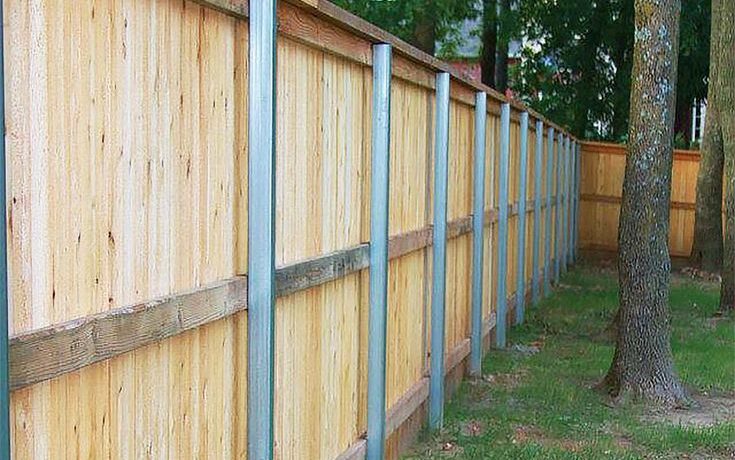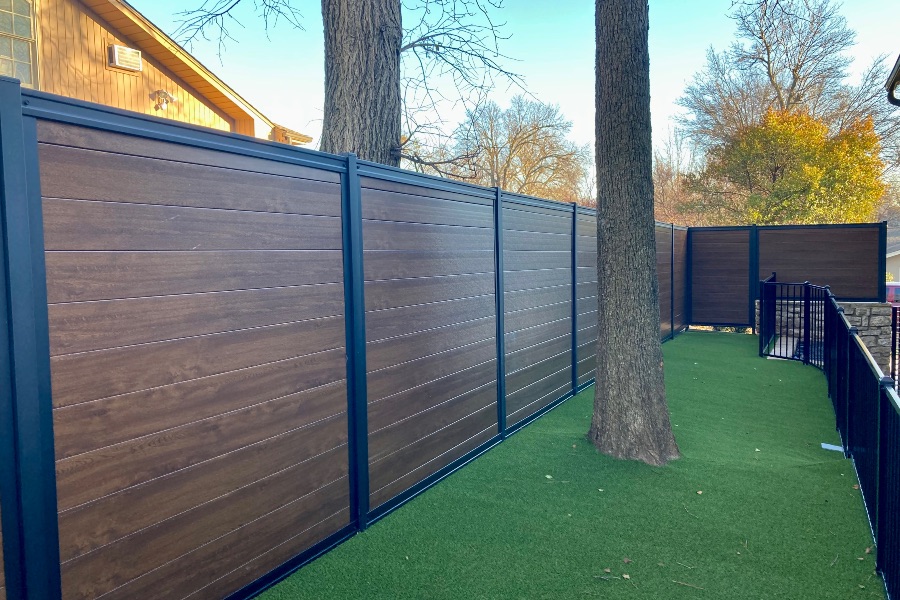All Categories
Featured
Selecting the ideal secure fencing material for your residential property is a considerable decision, and each option includes its own set of advantages and challenges. Timber, plastic, and aluminum are amongst the most preferred materials for both residential and commercial secure fencing. Right here's a breakdown of the pros and cons of each to assist you make a decision which is ideal for your demands.
Timber Secure Fencing. Pros:
Visual Charm: Timber offers an ageless, all-natural look that enhances virtually any design of property. It can be repainted or discolored in a wide variety of colors, permitting for complete customization. Whether you're aiming for a rustic, country-style appearance or an extra polished and polished look, timber is versatile.
Cost-Effective: Usually, wood fences are just one of the most affordable alternatives when it comes to upfront costs. It's a wonderful option for those on a spending plan that desire a quality fence without a high rate tag.
![]()
Personalization: Wood can be quickly adapted to fit any shape or dimension. You can choose from various styles such as personal privacy, picket, or ranch-style fences. It's likewise very easy to change, repair, or change components if needed.
Cons:
Upkeep: Wood fences call for routine upkeep. They need to be discolored or painted occasionally to avoid bending, bug, or rot infestation. Without maintenance, wood can weaken faster, especially in wet or moist environments.
Sensitivity to Damage: Timber is vulnerable to harm from pests, such as termites, and climate condition, like high winds, rainfall, or snow. Gradually, direct exposure to these aspects can trigger the wood to split, splinter, or warp.
Much Shorter Life expectancy: While wood fences can last for several years, they normally have a shorter lifespan compared to plastic or light weight aluminum, especially if not preserved regularly.
Plastic Fencing. Pros:
Low Maintenance: One of one of the most eye-catching attributes of plastic fences is that they require little to no maintenance. Unlike timber, vinyl does not need to be repainted or discolored. It's immune to fading, splitting, and warping, making it excellent for those that desire a problem-free fence.
Longevity: Plastic fences are extremely durable and can withstand rough weather, consisting of severe warm, hefty rainfall, or snow. They're additionally immune to bugs like termites, which can destroy wood fencings.
Lengthy Lifespan: Vinyl fences can last for 20-30 years or more with very little maintenance. Several manufacturers provide service warranties, giving satisfaction and more enhancing the value of your investment.
![]()
Selection of Styles: Readily available in a series of shades, textures, and styles, vinyl fencings can mimic the look of timber but without the maintenance. They are offered in vogue like privacy, picket, and ornamental, making them highly personalized.
Disadvantages:
Greater First Price: The in advance price of plastic fence is normally more than wood, making it much less budget-friendly for some. However, its durability and low upkeep make it a rewarding financial investment in the lengthy run.
Breakable in Cold Weather condition: In cooler climates, vinyl can become fragile with time, which makes it a lot more susceptible to splitting if subjected to impact. This might be a problem in areas with rough winters.
Minimal Customization: While vinyl comes in a range of colors and styles, it's not as personalized as timber. Vinyl may not be the ideal choice. if you have an extremely specific vision in mind.
Light Weight Aluminum Secure Fencing. Pros:
Low Upkeep: Light weight aluminum is an additional product that requires extremely little maintenance. Unlike wood, it does not rust, wear away, or fade. This makes it perfect for atmospheres with severe weather condition or coastal areas where saltwater can cause rust.
Sturdiness: Light weight aluminum fences are understood for their toughness and lengthy life expectancy. They can stand up to severe weather condition, and unlike wood or plastic, they are resistant to insects and won't wear away in time.
![]()
Visual Charm: Light weight aluminum fences give a streamlined, sophisticated look and are usually made use of for ornamental functions. They are offered in various styles and finishes and can enhance the overall visual charm of your property.
Safety And Security: Aluminum is a durable material, making it an excellent choice for offering protection around your residential property. It's commonly utilized for domestic safety fence in addition to for pool units.
Cons:
Expense: Aluminum fences are typically more pricey than wood and often even plastic, specifically when going with attractive or customized layouts. The initial price may be a deterrent for some residential or commercial property proprietors.
Less Personal Privacy: One of the drawbacks of light weight aluminum is that it typically offers much less privacy compared to wood or plastic. The gaps in between the slats or bars can be wide, which enables individuals to see through the fence. This might not be the ideal alternative. if privacy is essential to you.
Nicking: While aluminum is sturdy, it is vulnerable to nicking from heavy effects, such as car crashes or criminal damage. While it won't corrosion, a dent can compromise its look and honesty.
Which Product Should You Choose? The decision between plastic, wood, and light weight aluminum fence comes down to your spending plan, the amount of upkeep you're willing to take care of, and the details needs of your residential or commercial property. If you favor an all-natural, customizable look and are prepared to preserve it, wood may be the method to go.
Consider your residential property's environment, the level of privacy or protection you require, and the lasting financial investment you're prepared to make. Whichever product you select, each deals unique advantages that can enhance your home or business while giving performance and design.
Timber Secure Fencing. Pros:
Visual Charm: Timber offers an ageless, all-natural look that enhances virtually any design of property. It can be repainted or discolored in a wide variety of colors, permitting for complete customization. Whether you're aiming for a rustic, country-style appearance or an extra polished and polished look, timber is versatile.
Cost-Effective: Usually, wood fences are just one of the most affordable alternatives when it comes to upfront costs. It's a wonderful option for those on a spending plan that desire a quality fence without a high rate tag.

Personalization: Wood can be quickly adapted to fit any shape or dimension. You can choose from various styles such as personal privacy, picket, or ranch-style fences. It's likewise very easy to change, repair, or change components if needed.
Cons:
Upkeep: Wood fences call for routine upkeep. They need to be discolored or painted occasionally to avoid bending, bug, or rot infestation. Without maintenance, wood can weaken faster, especially in wet or moist environments.
Sensitivity to Damage: Timber is vulnerable to harm from pests, such as termites, and climate condition, like high winds, rainfall, or snow. Gradually, direct exposure to these aspects can trigger the wood to split, splinter, or warp.
Much Shorter Life expectancy: While wood fences can last for several years, they normally have a shorter lifespan compared to plastic or light weight aluminum, especially if not preserved regularly.
Plastic Fencing. Pros:
Low Maintenance: One of one of the most eye-catching attributes of plastic fences is that they require little to no maintenance. Unlike timber, vinyl does not need to be repainted or discolored. It's immune to fading, splitting, and warping, making it excellent for those that desire a problem-free fence.
Longevity: Plastic fences are extremely durable and can withstand rough weather, consisting of severe warm, hefty rainfall, or snow. They're additionally immune to bugs like termites, which can destroy wood fencings.
Lengthy Lifespan: Vinyl fences can last for 20-30 years or more with very little maintenance. Several manufacturers provide service warranties, giving satisfaction and more enhancing the value of your investment.

Selection of Styles: Readily available in a series of shades, textures, and styles, vinyl fencings can mimic the look of timber but without the maintenance. They are offered in vogue like privacy, picket, and ornamental, making them highly personalized.
Disadvantages:
Greater First Price: The in advance price of plastic fence is normally more than wood, making it much less budget-friendly for some. However, its durability and low upkeep make it a rewarding financial investment in the lengthy run.
Breakable in Cold Weather condition: In cooler climates, vinyl can become fragile with time, which makes it a lot more susceptible to splitting if subjected to impact. This might be a problem in areas with rough winters.
Minimal Customization: While vinyl comes in a range of colors and styles, it's not as personalized as timber. Vinyl may not be the ideal choice. if you have an extremely specific vision in mind.
Light Weight Aluminum Secure Fencing. Pros:
Low Upkeep: Light weight aluminum is an additional product that requires extremely little maintenance. Unlike wood, it does not rust, wear away, or fade. This makes it perfect for atmospheres with severe weather condition or coastal areas where saltwater can cause rust.
Sturdiness: Light weight aluminum fences are understood for their toughness and lengthy life expectancy. They can stand up to severe weather condition, and unlike wood or plastic, they are resistant to insects and won't wear away in time.

Visual Charm: Light weight aluminum fences give a streamlined, sophisticated look and are usually made use of for ornamental functions. They are offered in various styles and finishes and can enhance the overall visual charm of your property.
Safety And Security: Aluminum is a durable material, making it an excellent choice for offering protection around your residential property. It's commonly utilized for domestic safety fence in addition to for pool units.
Cons:
Expense: Aluminum fences are typically more pricey than wood and often even plastic, specifically when going with attractive or customized layouts. The initial price may be a deterrent for some residential or commercial property proprietors.
Less Personal Privacy: One of the drawbacks of light weight aluminum is that it typically offers much less privacy compared to wood or plastic. The gaps in between the slats or bars can be wide, which enables individuals to see through the fence. This might not be the ideal alternative. if privacy is essential to you.
Nicking: While aluminum is sturdy, it is vulnerable to nicking from heavy effects, such as car crashes or criminal damage. While it won't corrosion, a dent can compromise its look and honesty.
Which Product Should You Choose? The decision between plastic, wood, and light weight aluminum fence comes down to your spending plan, the amount of upkeep you're willing to take care of, and the details needs of your residential or commercial property. If you favor an all-natural, customizable look and are prepared to preserve it, wood may be the method to go.
Consider your residential property's environment, the level of privacy or protection you require, and the lasting financial investment you're prepared to make. Whichever product you select, each deals unique advantages that can enhance your home or business while giving performance and design.
Latest Posts
Don’t Miss Exclusive Auto Repair Specials in Chicago at Montclare Auto Repair
Published May 26, 25
1 min read
Explore Brake Repair & More: Full Services Guide from Montclare Auto Repair
Published May 26, 25
1 min read
Secure Your Investment with Expert Gutter Installment
Published May 21, 25
1 min read